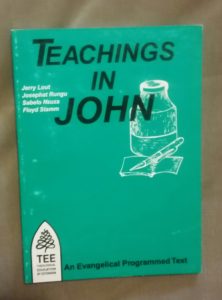Most people the world over forgive offenses made by newcomers – especially when the error is done in ignorance.
We found the statement true, at least among the Kuria. Our failure as green missionaries to extend basic “please-enter-for-a-cup-of-tea” hospitality, drew no further mention from the slighted delegation of elders.
”Hello, I am Reverend Joseph Muhingira.”
I drew comfort being courteously received by the local Overseer.
Muhingira welcomed us to his cement-plastered, tin-roofed home where his wife, Esther greeted us warmly one evening. Entering the grounds we noted several range cows – brought in from their day of grazing – jostling, mooing in the tight corral outside, just beyond the dining room. The holding pen was a weave of rough-hewn poles fashioned from skinny felled trees. Such trees dotted the rolling terrain of the area.
Esther and their eldest daughter, Robi, served my family up our first Kuria meal – roast chicken, a local spinach-like green called Sukumawiki, a cup of broth served in a modest tin bowl. And Ugali.
Ugali – a kind of corn-meal mush, was brought to the table hot – baked firm, molded in a half-moon-shaped metal bowl. Esther deftly inverted the bowl, planting it top-down on a round serving plate. She lifted the metal bowl, leaving the spherical hill of ugali steaming before us. The ugali had no odor. We did catch the fragrance of a kerosene flame. It shone from the single lantern perched atop a seasoned chest-of-drawers at the edge of the tight dining area.
A staticky short-wave radio, powered by D-size batteries, rested on the same furniture piece. From it there rang a distinct mix of African tones – high-pitched, electric guitar-plinking blended with smooth Swahili vocalists. Passing hole-in-the-wall cafes months before along Nairobi city streets I had wondered if more than one song had found its way from a composer’s pen. By now, I had started making peace with the style’s apparent monotony.
The lantern’s glow thrust eerie shadows jittering and waltzing in irregular moves along a wall, reflecting mother and daughter motion as they tended to the servings. We ate our fill and washed the remnants down with hot chai – cooked with sugar and milk thrown in together.
“Mungu awabariki.” Our first dining experience in Kuria-land had ended as pleasantly as it had begun.
Thanking our hosts with the Swahili “God bless you”, we stepped from the humble dwelling. Overseer Muhingira led us on the foot-path to our little VW. Light from the vivid Kenya moon played on Julie’s upturned eyes and across the soft blanket encircling her face, giving the blanket a magical look.
The evening had gone well – Muhingira, gracious, gentleman-like. Esther’s warm personality had fit naturally with her talent at food preparation.
I turned the engine and we followed the dirt track home to the mission. In the quiet and calm of the Africa night, it seemed we had moved to a peaceful wonderland.
Meeting our neighbor, Grace – learning her story – would challenge such a notion to the core.
©2017 Jerry Lout





